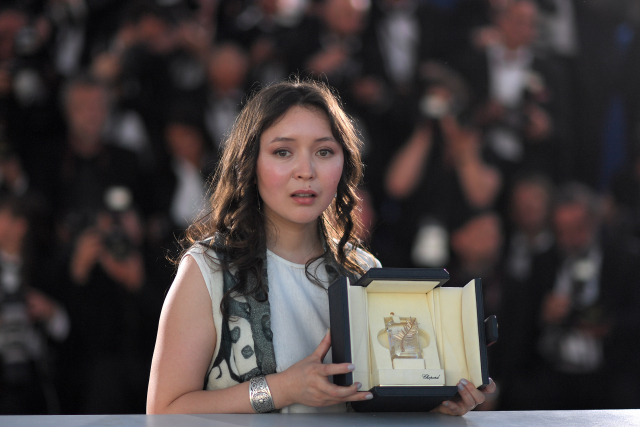
Kazakh actress Samal Yeslyamova poses with her trophy. Image: LOIC VENANCE / AFP
Samal Yeslyamova almost burst into tears when she received a surprise award for best actress at the Cannes film festival last month.
“When they announced my name I nearly cried: ‘but what about our movie?'” Yeslyamova told AFP, saying the entire film crew deserved an award.
The 33-year-old Kazakh actress won international acclaim for her wrenching portrayal of a Central Asian single mother struggling for survival in Russia in Sergey Dvortsevoy’s film “Ayka.”
While an illegal migrant, the young woman from Kyrgyzstan gives birth to a baby that she abandons at the maternity hospital.
The idea for the film was based on tragic statistics from 2010 when 248 babies were abandoned by Kyrgyz mothers in Moscow’s maternity wards.
Dressed in a navy suit and wearing no makeup — just like her character — the actress sounded almost nostalgic as she recalled her grueling on-set experience.
Dvortsevoy, who is known for his documentary style, insisted that she must be — and not simply look — exhausted in front of the camera, the actress said, adding she would run before shoots to look haggard.
During shooting she would also get just five hours of sleep every night, she said.
“But others including the director slept even less — just two hours a night,” Yeslyamova said during an interview in Moscow at GITIS, one of Russia’s most prestigious drama schools where she studied.
‘Authenticity and pain’
Once separated from her infant, the film’s title character Ayka suffers terribly, tortured with guilt for rejecting the baby and with her feelings of attachment to the child.
“The story about a bond between mother and child touches everyone because it could happen anywhere,” said Yeslyamova, who spent months observing the lives of young female immigrants in Moscow.
“We tried to play it like it is.”
For the entire duration of the 100-minute-long movie, the camera constantly follows her as she first abandons her child and then tries to survive in snowy, unwelcoming Moscow.
As she plucks chickens, shovels snow and tries to drain her sore breasts of milk in a grubby overcrowded apartment she is constantly hurting, tormented by guilt.
“Russian cinema has not seen such a degree of authenticity, repressed pain and energy for a long time — maybe never,” said respected news website Meduza.
Dvortsevoy said in Cannes that the script was not set in stone but was a work-in-progress, with Yeslyamova’s character beginning to “live a life of her own”.
The actress is a proponent of the Stanislavsky school of acting, an approach developed by 20th-century Russian theatre director Konstantin Stanislavsky who stressed the importance of emotional authenticity.
“She was a special student: modest but reliable and intense,” said Yevgeny Kamenkovich, a director who taught the actress at GITIS.
He said she “acted from experience because she cannot simply imitate.”
Another of Yeslyamova’s teachers was acclaimed Russian filmmaker Andrey Zvyagintsev, director of “Leviathan” and “The Return”, who sat on the jury at Cannes this year.
“GITIS taught me to be free,” said Yeslyamova.
Hero in Kazakhstan
The actress said she flew back from Cannes to a hero’s welcome in her native Kazakhstan.
“It was really amazing,” she said.
“When I arrived, customs officers recognized me and smiled at me and a whole crowd of actors was waiting for me at arrivals with flowers, even though it was four in the morning,” she said with a shy smile.
Yeslyamova — whose Cannes win is unprecedented for Kazakhstan — received keys to a new two-bedroom apartment, a reward that is usually reserved for Olympic champions.
Like Yeslyamova, director Dvortsevoy also comes from Kazakhstan.
The actress was born in a village and went to a local arts college in Petropavlovsk, a city on the Russian border.
When she was 19, she won a lead role in Dvortsevoy’s first feature film “Tulpan” or Tulip, playing a mother of three children. The movie won the Un Certain Regard prize at Cannes in 2008.
Shooting took place in a desert where temperatures reached 50 degrees Celsius (122 Fahrenheit) in the shade.
“I decided then that if I can get through this, I will become a real actress, ” she said with a disarming smile. NVG
RELATED STORIES:
Japan wins Palme d’Or with ‘Shoplifters’, grand prize to Spike Lee